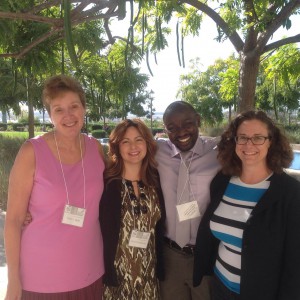Our faculty members participate in conferences around the world, conduct groundbreaking research, and publish books and journal papers that contribute to their field and highlight their expertise. We feature those accomplishments and more in this section.
College of Arts and Humanities
Miguel Dominguez, professor of modern languages, presented “No problemo. The Other ‘Spanglish’: Hispanisms in U.S. English” at the American Association of Teachers of Spanish and Portuguese’s 2014 Conference on Portuguese and Hispanic Languages and Literature, which took place on Oct. 11 at Moreno Valley College.
Exploring the use of words like el Niño, alligator, fritos, rodeo, gratis, and toros in the English lexicon, and expressions like holy mole, it take two to tango, hasta la vista, baby, and vaya con Dios, Dominguez argues that words borrowed from Spanish are a “salient characteristic of English of the U.S.”
“My purpose was to bring about a rethinking of ‘Spanglish’ or the mixture of Spanish and English. The predominate opinion is that only Latinos here use Spanglish. But what about English Speakers? Language borrowing is a two-way street,” he said.

Nancy Erbe, professor of negotiation, conflict resolution and peacebuilding, along with NCRP student Mukurima Muriuki and NCRP alumni Giuseppina Wright and Yvette Durazo, gave a panel presentation titled “Cross Cultural Collaboration and Leadership” at the Peace and Justice Studies Association annual conference at the University of San Diego October 16-18.
Erbe also participated in a round table discussion on “Humanities and Fine Arts at the Peace Studies Table” with faculty and students from Georgetown, Mount Union and Notre Dame.
Jung-Sun Park, professor of Asian studies, presented “Pop Culture and Global Korean Networks: A Case Study of Korean Americans” at a conference hosted by the Association for the Studies of Koreans Abroad that took place in September in Korea.
College of Education
Jim Cooper, professor emeritus of graduate education, and Pamela Robinson, assistant chair of liberal studies, had their article “Using Classroom Assessment and Cognitive Scaffolding to Enhance the Power of Small-Group Learning,” accepted for publication in the Journal on Excellence in College Teaching (vol 24, issue 3 and 4, 2014) as part of a special issue on small-group learning in higher education.
The article highlights research-based active learning strategies in college teaching that Cooper and Robinson have developed and honed over the past 20 years.
College of Health, Human Services and Nursing
Crystal Chavez, lecturer in the School of Nursing, has been recognized with a Daisy Faculty Award, a national nursing award given to nursing faculty–nominated by their colleagues–who demonstrate commitment to nursing education and have a strong and positive impact on students.
College of Natural and Behavioral Sciences
Ramon Torrecilha, professor of sociology, is being honored on Oct. 23 with the alumni achievement award from his alma mater, Portland State University.
Ken Ganezer and Jim Hill, professors of physics, were authors on a study published in Physical Review D (October 14, 2014) that is based on years of research they and a collaboration of scientist throughout the world conducted at the Super-Kamiokande facility in Japan. “Search for proton decay via p–>νK+ using 260”‰”‰kiloton·year data of Super-Kamiokande” covers data from April 1996 to February 2013 looking at proton decay but shows evidence of the greater stability. According to a synopsis written on the study by the American Physical Society (physics.asp.org), “The proton’s observed stability places constraints on certain extensions of the stand model of particle physics.”
Expert Quotes
Recent quotes and/or media interviews in the media from faculty
“It’s a domino effect. As soon as there is a crisis, people want to watch the news. Most people have several stations that they can watch. So stations have to intensify what they broadcast and distill it to the most dramatic thing that they can say.” – Larry Rosen, professor of psychology, quoted in “Media changes course on Ebola” (Columbia Journalism Review, Oct. 17, 2014).
“Just the mere fact that they were not able to use the device caused a significant amount of anxiety in these students. SO it is a problem, absolutely. It’s a major problem.” -Nancy Cheever, associate professor of communications, quoted in “Study: College students addicted to cellphones” (Press-Telegram and Daily Breeze, Sept. 30, 2014)
